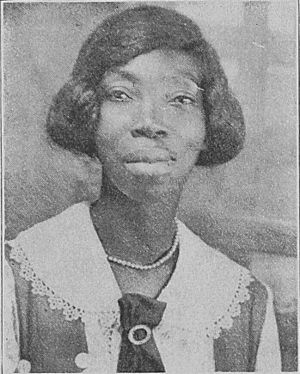Priscilla Jane Thompson facts for kids
Quick facts for kids
Priscilla Jane Thompson
|
|
|---|---|
 |
|
| Born | 1871 Rossmoyne |
| Died | 1942 |
| Occupation | Poet, lecturer |
| Family | Clara Ann Thompson |
Priscilla Jane Thompson (born in 1871 – died in 1942) was an American poet. She is well-known for her early African-American poetry. Her works are often featured in collections of important poems by Black writers.
Contents
Early Life and Family
Priscilla Jane Thompson was born in 1871 in Rossmoyne, Ohio. Her parents, John Henry Thompson and Clara Jane Gray, were formerly enslaved people from Virginia. Priscilla came from a very artistic family.
Creative Siblings
Her siblings were also talented. Her sister, Clara Ann Thompson, and brother, Aaron Belford Thompson, were also poets. Another brother, Garland Yancey Thompson, was a sculptor.
Life in Rossmoyne
Priscilla had poor health, which kept her from becoming a schoolteacher. However, she still found ways to share her knowledge and creativity. She wrote many poems, gave lectures, and taught Sunday school. Priscilla never married and lived her whole life in Rossmoyne with her sister Clara and brother Garland.
Her Published Works
Priscilla Jane Thompson published two books of her own poetry. She printed these books herself, which is called "self-publishing."
Books of Poetry
Themes in Her Poetry
Her poems covered many different topics. She wrote about:
- Religion: Her faith and spiritual beliefs.
- Slavery and the African-American Experience: The difficult history of slavery and the lives of African Americans.
- Small-Town Life: Everyday events and feelings in a small community.
She also wrote love poems. Some of these were about chivalry, which means showing respect and honor. Others were love poems written to other women. Priscilla often used African-American dialect in her poems. One example is her long poem, "The Favorite Slave’s Story," which has 72 stanzas!
Later Life and Legacy
Priscilla Jane Thompson passed away on May 4, 1942. Her poetry continues to be studied and appreciated today as an important part of American literature and African-American history.
 | DeHart Hubbard |
 | Wilma Rudolph |
 | Jesse Owens |
 | Jackie Joyner-Kersee |
 | Major Taylor |

